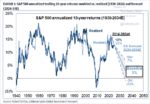Overview: The dollar is somewhat better offered today ahead of the October CPI report. The US House of Representatives may hold a vote today on a continuing resolution to avoid a partial government shutdown at the end of the week. Narrow ranges have prevailed. Most emerging market currencies are firmer, though paradoxically, the South Korean won is the weakest, despite a strong equity market rally (~1.2%), encouraged by the first in increase in memory-chip exports in 16 months in October.
Most of the large bourses in the Asia Pacific rose with the notable exception of Hong Kong and India. Europe's Stoxx 600 is extending yesterday's recovery and the two-day advance is recouping most of the 1% drop seen before last weekend. US index futures are trading with a firmer bias. Benchmark 10-year bonds are also trading higher. European yields are off mostly 1-2 bp. The 10-year US Treasury yield is three basis points lows near 4.61%. It finished last week around 4.65%. Lower yields and a mostly softer dollar have helped gold sustain yesterday's recovery from slightly below $1932 to almost $1950. The yellow metal is trading firmly but still below $1950. December WTI is extending yesterday's gains and is trading near $78.50. It reached a five-day high near $78.70. Resistance is seen in the $79.25-$80.25 band.
Asia Pacific
Today's quiet Asia Pacific session is a brief lull ahead of tomorrow key reports. Australia will report its Q3 wage index, which likely accelerated. However, the recent rate hike by the Reserve Bank of Australia likely took that on board. Early Thursday, Australia reports the October employment situation. Job growth seen accelerating but not enough to absorb the new entrants into the labor market. The unemployment rate may tick up if the participation rate does. Japan will report Q3 GDP early tomorrow. While consumption is likely to improve after contracting by 0.6% in Q2, it looks to be offset by the deterioration of trade. Net exports surged 1.8% in Q2, buoyed by increased tourism, may have contracted slightly in Q3. China will set the one-year Medium-Term Lending Facility rate (currently 2.50%) on Wednesday, and the most economists do not expect a change, according to Bloomberg's survey. Shortly after that China will reports on last month's economic activity. Retail sales are likely to have increased, though industrial output is expected to be little changed, as is fixed investment. Property investment contracted by 9.1% in September (year-to-date, year-over-year) and is seen remaining around there in October.
The dollar rose for the sixth consecutive session against the yen. It came within a few ticks of the 22-year high set in October 2022 (~JPY151.95). There was a hiccup near the US option expiration as the greenback was near the highs. As in early October, some thought it was official intervention. The dollar dropped quickly JPY151.20 and rebounded smartly. It chopped in a JPY151.50-JPY151.75 range. So far today it is in about a 20-pip range according to Bloomberg (~JPY151.60-80). There are $2.3 bln in options struck at JPY152 that expire tomorrow. The Australian dollar remained firm in quiet turnover yesterday. It held above $0.6300 in Europe and the US. It had bottomed before the weekend near $0.6240 and yesterday's high was around $0.6390. It is trading quietly in about a quarter-of-a-cent range above $0.6360. The yuan is threatening to snap a three-day decline. The dollar is reached CNY7.2980 yesterday, a six-day high, but settled on its session lows near CNY7.2890. Today, it slipped to around CNY7.2865 and is traded near CNY7.2880 in late turnover. The PBOC continues to set the dollar's reference rate ever so slightly lower (today CNY7.1768 vs. CNY7.1769 yesterday). The average in Bloomberg's survey was CNY7.2887, slightly lower for the second consecutive session. Lastly, note that reports suggest Beijing is considering a new CNY1 trillion (~$137 bln) funding program for the property market.
Europe
Unexpected, the number of payrolled employees in the UK not only rose in October but the 11k loss of jobs in September was revised to a 32k gain. Jobless claims rose by 17.8k after September's 20.4k rise was revised to 9k. Average weekly earnings (September) moderated to a 7.9% (three months, year-over-year) pace from a revised 8.2% pace in August (initially 8.1%). It is the second consecutive decline, even if not as much as economists expected, and is the slowest in four months. Excluding bonuses, the moderation was less impressive (7.7% vs. a revised 7.9%, from 7.8%). Tomorrow, the UK reports October CPI. The question is not about the direction but the magnitude. In October 2022, UK CPI jumped by 2.0%. This will drop out of the 12-month comparison and be replaced by a 0.1%, according to the median forecast in Bloomberg's survey. The base effect will see headline inflation fall toward 4.7%-4.8% from 6.7% in September. It would be the first reading below 5% since October 2021. The core rate will be stickier. It is seen slipping to 5.8% from 6.1%. That would match the slowest pace of the year set in January.
Slowly, sentiment in Germany seems to be improving. Like many other large bourses, the DAX fell for three months through October. It has recouped most of October's losses here in the first part of November. The assessment of the current situation improved ever so slightly (-79.8 vs. -79.9) for the first time since April. The expectations component turned positive (9.8) for the first time since April. It is the fourth consecutive month that expectations have improved. Still, the German economy, which ironically may surpass the size of the Japanese economy this year due to the euro's roughly 15% appreciation against the yen this year, is seen contracting by 0.1% in Q4 (following a similar performance in Q3). The Bundesbank projects the economy will shrink by 0.3% this year. The government's latest forecast is for a 0.4% contraction, while the IMF warns of a 0.5% reduction in output.
For the past five sessions, the euro has moved sideways in a roughly $1.0655-$1.0725 range. It is fraying the upper end of that range in the European morning, rising to about $1.0730. It has also taken out a short-term downtrend line found near $1.0700 today. The next immediate target is last week's high near $1.0755. The next leg, if/when $1.0765 is conquered, may carry the euro into the $1.0800-50 area. Our working hypothesis is that the euro is in the middle of a correction of the 8.25-cent decline from the mid-July high. The line between technical correction and a bull market for the euro may be in the $1.0960-$1.1000 area. This general view holds for sterling, as well. It made a new session high late yesterday, near 1.2280, recouping (38.2%) of last week's losses. It is absorbing offers around $1.2300-10 in Europe. Last week's high was near $1.2430, just in front of the 200-day moving average (now ~$1.2435) and the (38.2%) retracement of the losses since mid-July. If that is overcome, sterling could make its way back toward $1.2580-$1.2600.
America
US October CPI is today's highlight. The median forecast in Bloomberg's survey calls for a 0.1% increase. That would match the smallest monthly rise this year, seen in March and May. The small increase may reflect the decline in gasoline prices and early holiday sales. That could translate into a 3.3% year-over-year pace, the first decline in four months. In October 2022, CPI had risen by 7.7% over the previous 12 months. Core prices are expected to have risen by 0.3% for the third consecutive month. That points to a minor change in the year-over-year core rate of 4.1%. Changes in how health insurance costs are calculated and sourced is a wild card. Although it does not get heavy weight, large move could still distort the headline rate and core services to the upside, but are unlikely to impact the PCE deflator, which the Fed targets.
Note that five Fed officials speak today but the views are mostly known. The general line is that while policy is restrictive, the Fed is not sure it is sufficiently restrictive and retains a tightening bias. Some officials have suggested another hike may be necessary, but most seem to believe the Fed can take its time to monitor the incoming data before deciding. Currently, the Fed funds futures imply slightly less than a 15% chance of a hike at next month's meeting. Powell has intimated that is too early to discuss rate cuts, but the September Summary of Economic Projections saw the median dot anticipate that two cuts next year would be appropriate.
The North American session extended the US dollar's range against the Canadian dollar in both directions yesterday. However, it was stuck in a range that was a little more than 20-ticks on both sides of CAD1.3800. The Canadian dollar is a laggard today, and the US dollar is holding mostly above CAD1.3800. The high at the end of last week was near CAD1.3855. Beyond that, the high for the year looms, set November 1 near CAD1.3900. After reversing lower before the weekend, the greenback continued to fall against the Mexican peso yesterday. It briefly traded below MXN17.5750 and it has been sold below MXN17.55 today. The band between MXN17.44 and MXN17.53 holds retracement targets and congestion, suggesting support.
Full story here Are you the author? Previous post See more for Next post
Tags: #USD,Currency Movement,Featured,federal-reserve,Germany,inflation,newsletter,U.K.,US





















